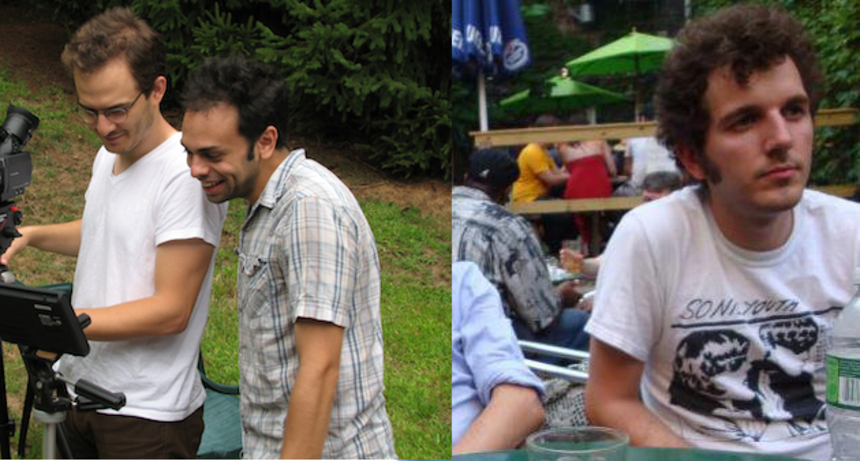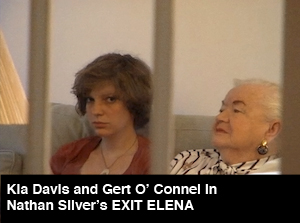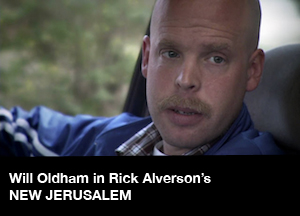Indie Beat: Nathan Silver And Christopher Bell Talk The Utter Joy And Insanity Of Truly Independent Filmmaking

I'm looking at the word 'beat' and thinking the beat of a heart and who is behind that; who is behind the creativity of these films? So Indie Beat is about the people and the conversations on the world of independent filmmaking -- okay. Today's piece is then something of a homecoming, and equally a coming out, as it is the first edition of the column where I had the opportunity to sit down and talk with two filmmakers who live and play and work in this realm. These are filmmakers I greatly admire for their measured, thoughtful films, and if anything I just wanted to know a little bit more about what made them tick.
Nathan Silver has just wrapped his fourth feature entitled Simian. His second feature Exit Elena, about a live-in nursing aide, is coming off a strong year on the festival circuit with a one week run at reRun in Brooklyn from July 12th-18th. It also plays Lincoln Center's Indie Night July 25th. His third feature Soft In The Head, about a wayward woman who is taken in at a makeshift men's shelter just played at Brooklyn Film Festival where its lead Sheila Etxeberría won for best actress. It will continue on the festival circuit into the fall, so be on the lookout.
Christopher Bell, once a writer for Indiewire's The Playlist, is in post production for his first feature entitled The Winds That Scatter. You can watch his lovely meditative short film Bridges right here.
In sitting down for a Skype call with Silver and Bell (I'm in LA and they're in New York), I was aiming to create less a straight-forward interview environment and more a space where we could cultivate an open and honest conversation about the day-to-process of being a filmmaker, which is, as it is with anything, a myriad of emotions and practices, highs and lows. Transparency and a sense of trust from all sides was essential in creating an authentic space where something about art and artists could really be shared. I hope what follows gives you a sense of that -- read on!
-----
ScreenAnarchy: As children, how did you perceive film and did you have any notion of what a filmmaker did?
Nathan Silver: I never really wanted to make movies as a child. I remember seeing a few when I was like nine or ten. I saw Annie Hall and I found it extremely depressing. I saw a Bunuel movie when I was very young too. I think it was The Discreet Charm of the Bourgeoisie where there's a scene in a prison. But I don't know if that's a memory I planted in my mind or not. The idea of having to sit through a movie was not necessarily a pleasant one for me as a child. All the things that cater to children have the same formula. You know that there are these certain tragedies and certain conflicts that are going on. So I never wanted to make movies based off that.
Then when I was at NYU for playwriting I interned for Richard Foreman and he was very bitter and talked about how theater was bullshit and how movies were the future. He would bring up all these movies from the 50s, 60s 70s, and then I'd go and watch those. Kim's Video was just around the corner so I'd pick up Pasolini and Fassbinder and all these filmmakers whom I had neglected to watch when I was younger. I immediately quit that internship and I went from playwriting to screenwritng as my major. I never thought I'd want to be a director. I never thought anything like that. When I was younger I thought a director was a dictator. As I direct more movies that notion does not ring true for me. When I was making short films I tried to be a dictator on set and I hated the results. I'm all for the death of the author and for complete collaboration. With my last movie it was really just a meeting of the producer, the DP and me -- we co-wrote the script. We worked on that story together. It was a unit, you know.
There's a community you're ultimately building there.
NS: Yeah, exactly. I mean I'm a terrible leader. I bring chaos, so I need other people around me to help bring order to it all.
You're then all swimming in that pool of chaos together.
NS: Yeah, we're making something out of it and that makes sense to me. That's great. Having everyone just bring coherence to the thing is great and that brings me joy. Much more joy than... look, I have crummy ideas. I don't have good ideas, so I need others around me...
[Bell and I both smile at this. Bell shakes his head]
Christopher Bell: I think filmmaking is chaotic. While it can be this way on every level of budget, it is especially on our level where we are working really cheaply. So you gotta figure out a way to harness that rather than water it down.
Do you think that working within a chaotic space like that, a really immediate space, takes a lot of the abstractions and notions, things that we tend to hypothesize about filmmaking when we're sitting around just chatting...
NS: That sense of control...
That sense of control and that sense that you can lose that control any minute, but you're also in a position to get it back too...
CB: The problem solving is probably one of the more fun things about filmmaking. When you have a plan... and I always subscribe to have a plan... but when it doesn't work out, you try right then and there something better. Not just something that works, but better. And when you do there's that great feeling that you can't replicate. I don't know if I even answered the question... was there even a question?
It's a conversation. My sense of it is you have to embrace that chaos because it's a part of where the joy lies, right?
CB: Yeah, and I also think it's kinda insane. I mean I think we're both insane doing what we do. It's just so stressful, but you know it's kinda fun. I think that keeps a lot of people away. They have this notion that they have to do it a certain way. I think that's all bullshit. Nathan just shot on the C300 and I was shooting on the T2i for both my feature coming up and my short. These aren't expensive cameras and you talk to some people who've been to film school or they have these scripts they want to do and it's like "just get a little money and go shoot something." It doesn't have to be in an apartment or anything. Embrace the free wheeling nature of something. Have a plan, do collaborations -- filmmaking is all collaboration. Do that and try and improve yourself. Nathan makes a movie every year. I'm going to try and make a movie every year. I can't retain information so I have to keep repeating. I see a lot of people, I hear about a lot of people being held back because they think that a film has to be this way...
 I want young filmmakers, film students, to watch something like Exit
Elena. I want them to know what you can do with a little bit of money. That wasn't even shot on DSLR.
I want young filmmakers, film students, to watch something like Exit
Elena. I want them to know what you can do with a little bit of money. That wasn't even shot on DSLR.NS: It was DVX, it was miniDV.
And that can sometimes be detrimental to how people perceive it, like it can't get a VOD release because it looks too micro-budget.
NS: People have told me they were going to turn it off within the first five minutes, but that there was something else there, which I love to hear.
So when we talk about quality we gotta get away from merely the notion that it looks good technically. It might not look great, but beyond that there's something about it that's working.
NS: There's something else happening, under the surface or over the surface.
CB It's like what are we looking at? "Oh, does the movie have shallow depth of field?" Fuck that. First of all, that is overused, and second of all, audiences really don't care whether it's found footage or that's just the camera you're using. Use it as a tool to tell your story. Nathan and I were at a festival together and the audience loved Exit Elena. They didn't once mention the camera. I think I mentioned the camera. Audiences don't care.
Now all three of us have been to festivals and seen indie movie. To be honest, sometimes really rough, really shitty movies get played, get sold, get critical acclaim, get fans... whatever.
More often than not those can just feel mediocre to me, because they're playing it so, so safe. And I don't want to merely criticize in that narrow way, but that is a frustration I encounter a lot. In thinking about what I am going to put into the column every two weeks I always bump up against that, because that's always a part of the conversation I have. It's: "What's authentic out there?" Not necessarily pushing boundaries to the extreme, but what's just being authentic to the group's process, to the storyteller's process vs what's just kind of operating under the same, old, tired and worn trope. I'm constantly bumping up against those films, those kinds of stories in looking at materials and angles for this column.
NS: I am so, so bored by so many fucking movies I see. I mean they just bore the pants off me. I'm not just talking about recent movies, I just mean movies in general. Now that's not to say my movies are all that interesting, but I think there's always that frustration with movies. You're like "why are these things made?" There's so much time and so much money going into these movies and it's like "why?"
CB: That's why I said we're probably insane for doing what we do. At least... Well I don't want to toot our own horns a lot, or at all, but yeah, I look at super slick movies and go: "why do you guys do that?" I mean it takes so long...
There's so much that goes into it. I mean you guys know first hand the reality of how much hard work goes into it these things, and at the end of the day I think it comes down to taste too, but my concern right now is did we plateau in terms of quality and what people expect, and is there then a generation that just shoots Youtube videos because of it, or continues to shoot "Little Miss Sunshine" after "Little Miss Sunshine"...
NS: In terms of Youtube there's really some fantastic stuff on Youtube. I mean you find the most bizarre things.
 It
can be very bizarre. And that's what kind of lovely and great about it,
thankfully. It seems like though that there is, for lack of a better
term, the junk culture which has proliferated, which I think "Spring
Breakers" pointed at, though didn't necessarily criticize. It's not a
judgmental film for sure. But it pointed at what we're kind of now in...
what do we move into, if we're already in this emptiness, this
excessive emptiness -- What's after that? And thankfully that's not the
whole picture. On an existential level, on a metaphysical level, you two
as storytellers bump up against that... your characters come to these
places where they're facing voids, facing nothing in someway.
Particularly with "Soft In The Head". It kind of felt like a
Dostoevsky story.
It
can be very bizarre. And that's what kind of lovely and great about it,
thankfully. It seems like though that there is, for lack of a better
term, the junk culture which has proliferated, which I think "Spring
Breakers" pointed at, though didn't necessarily criticize. It's not a
judgmental film for sure. But it pointed at what we're kind of now in...
what do we move into, if we're already in this emptiness, this
excessive emptiness -- What's after that? And thankfully that's not the
whole picture. On an existential level, on a metaphysical level, you two
as storytellers bump up against that... your characters come to these
places where they're facing voids, facing nothing in someway.
Particularly with "Soft In The Head". It kind of felt like a
Dostoevsky story.NS: It is based on one [Laughs] That's great. I'm really happy to hear that you picked up on that.
Was it "The Idiot"?
NS: It was The Idiot. Now, there are a few movies I've seen in the last year that I've just adored. Leviathan and Tabu really knocked my socks off. And so I look to those movies as some sort of hope for breaking things down a bit more, and realizing what you can do with a bunch of cameras, or what you can do with... I mean the way sound was handled in the second half of Tabu was really something.
You have "Tabu", "Leviathan", "Holy Motors", "Post Tenebras Lux"... they're all playing in very far flung fields of filmmaking. They're creating or shaping these really exciting dialects in the cinematic language. Those are also big films in some sense. There's am impressive scope to them. For you guys, you can't go right out the door and just do that, and maybe that's not what you would want to do personally.
NS: You mean because it's hard to get funding. Because they already have track records, like you have a Harvard professor.
Yeah, the "Leviathan" folks. Now what's the day to day for you two? What's happening when you're not on set, making a movie as it were. When you're sitting in your respected places of business or your home or wherever, what does that creative process look like then?
 CB: I'm
thinking about ideas day to day. I'm always thinking about the idea of
making movies and making my own and trying to unpack ideas that aren't
substantial. I try to watch a lot of movies too, but I also try to not
think about movies as well, not to actively do it. A big reason why I
quit writing about film was because it took so much out of me, and I
don't really think I'm that great of a writer. But I like to do other
things that have nothing to do with movies, that can influence me either
way. It's nice just to ride your bike or play video games or something
else so you're not so consumed with movies. The best part about Post Tenbebras Lux,
or the way that it could be described, is that there is so much life in
it. And you don't get that if you're 100% thinking about movies and
putting yourself in a box. You gotta go outside the box. Have a
combination of both. And then there's being miserable when somebody
doesn't like your film... that's a part of the day-to-day.
CB: I'm
thinking about ideas day to day. I'm always thinking about the idea of
making movies and making my own and trying to unpack ideas that aren't
substantial. I try to watch a lot of movies too, but I also try to not
think about movies as well, not to actively do it. A big reason why I
quit writing about film was because it took so much out of me, and I
don't really think I'm that great of a writer. But I like to do other
things that have nothing to do with movies, that can influence me either
way. It's nice just to ride your bike or play video games or something
else so you're not so consumed with movies. The best part about Post Tenbebras Lux,
or the way that it could be described, is that there is so much life in
it. And you don't get that if you're 100% thinking about movies and
putting yourself in a box. You gotta go outside the box. Have a
combination of both. And then there's being miserable when somebody
doesn't like your film... that's a part of the day-to-day.NS: Being miserable in general.
CB: And then there's real life too, which can sometimes suck. That's again why I said we're insane for doing this because real life...debt... love... that's part of the day-to-day.
NS: Well the reason you make movies is to forget that.
You're essentially getting the toxins out of your system.
NS: Exactly!
When you're not making a movie how are you living? How are you putting a roof over your head and food on the table?
NS: I'm still trying to figure it out. For me it's either freelance work or begging and borrowing. When you're in production it's obviously very difficult to be able to throw yourself into a full-time job, unless you've already established yourself at that place of work for a number of years and then have some flexibility or freedoms to go off and make a movie. I've never had that. I've had a lot freelance work that's come about through my father who produces corporate events. I've been able to work for these two wonderful women, Paola Freccero and Liz Ogilvie, they had a company called CrowdStarter. I helped them with outreach, which was to basically help filmmakers self-distribute their movies. I was advising on this and then also doing coverage for scripts, 'cause that's what I went to school for. The first feature I made I got paid to make. I never want to get paid to make another movie. I just know what comes with being paid and I don't want to be a part of that. Any of the money I made on the first film just went right back into that film anyway.
And it always does, unless, of course someone says something really unexpected and kind of absurd like "Nathan Silver... 'Exit Elena', 'Soft In The Head'... let's hire him for the next 'Saw' movie!"
NS: That'd be fucking stupid! And even if they did I would do a terrible job as I can only work in a certain realm. As soon as you understand what you can do and your capabilities, you understand where you're going to be a failure and where you're going to succeed. If you keep pushing yourself towards failure then you're going to be a failure for the rest of your life and I don't want to do that. I see a lot of filmmakers who want to make bigger things and that's fine, maybe that's great because that's part of their personality, but I want to make movies the way I see fit. I don't care about making my paycheck from my movies. It's not that way. I need to find another way to go about things, whatever that may be.
CB: Would you direct television?
NS: I think television for other countries, in other languages, would be fun.
CB: So you wouldn't be a director-for-hire?
NS: Well, that's a great gig, I mean to be paid for that. Now to expect that you're going to make your movies and get paid for them, that to me seems a ridiculous dream. I know that is not possible. To expect to make a living off of these kinds of small movies feels kind of absurd.
CB: And that's a good attitude to have. If you're going to keep at it, you know you're not going to make money. You'll probably lose money. And know that's just how it is.
NS: The best case scenario is that you don't involve your family and friends in the financing of your movie and that it still gets made.
So Nathan, you just finished shooting "Simian", and Chris, you're at some stage of post on your first feature.
CB: And I'm doing another feature in August.
So there are those times when you're in between projects. In that time is there ever the sense that you could almost just shut this off and walk away from it all?
NS: Every morning of my life I think about this. As I go through my day other problems arise.
CB: What else would we do?
The fact that the question is always there is maybe your answer.
CB: Maybe if we were to run out of ideas or stop meeting interesting people.
And to do that you'd have to go and live in a cave and even that would be interesting.
 Now, I wanted to talk about the care-taker elements in "Bridges" and "Exit
Elena", and to some extent, "Soft In The Head" with the older gentlemen who
is taking everyone in. You have the nanny in "Bridges" and the
live-in nursing aide in "Exit Elena. I've spent a lot of
time around nursing aides and elder care workers in nursing homes with
relatives. And then on the other hand, because of my own background
in education and
childcare, not to mention my sister's, father's and mother's respected
roles in these fields, as well as my father's time managing the Rhode
Island food bank and DC's largest soup kitchen, I am extremely
fascinated by these elements in the films and wanted to know how
these things came into play as they feel very authentic to me.
Now, I wanted to talk about the care-taker elements in "Bridges" and "Exit
Elena", and to some extent, "Soft In The Head" with the older gentlemen who
is taking everyone in. You have the nanny in "Bridges" and the
live-in nursing aide in "Exit Elena. I've spent a lot of
time around nursing aides and elder care workers in nursing homes with
relatives. And then on the other hand, because of my own background
in education and
childcare, not to mention my sister's, father's and mother's respected
roles in these fields, as well as my father's time managing the Rhode
Island food bank and DC's largest soup kitchen, I am extremely
fascinated by these elements in the films and wanted to know how
these things came into play as they feel very authentic to me. NS: For me, my father's mother came from New York to Boston when I was around fifteen. She had aides around her constantly and I got to know them. I found that fascinating because it was a really weird lifestyle, because they'd given up their lives for my grandmother, and they had families too, they had kids.
And all of a sudden they're a part of this other family.
NS: Yeah, and so I found that really strange. My mother has always taken in people and I think that fascinated me. When I was a little kid she took in these Salvadoran folks because she wanted to help them out. She's always wanted to be this caretaker, and now she expects things in return. Over time she's wanted people to show her that they appreciate her kindness, whereas in the past she didn't necessarily need that affirmation. So that plays directly into Exit Elena.
CB: I'm just gonna put this out there... I was raised by my grandparents. Now my mom visited, and she still does and I love her, but she just wasn't able to be in the position of being a parent. I also lived with my aunt who is about fifteen years older than me. So growing up she had kids when I was about ten or eleven, and I had to deal with that.
So these were all factors related to Bridges. The idea that I like is having an outsider make decisions for someone else's blood and kin. The outsider perspective is great, but it is also limited. You can't get a good picture of somebody entirely. That's what most interested me for Bridges. Then there's something like child protective services where you send a case worker to someone's house and the rules are "if the child's not safe take it, and if you don't know: take it." I was really struck by that mentality. To ruin somebody's life like that... what is the outside perspective? Anybody can lose their cool, and I thought about what if someone had lost their cool amidst my family situation... I could have been taken away.
So we were talking briefly about movies that don't take chances or are inauthentic and when we see it it's just like "oh! ugh, that's terrible!" and one thing I've been thinking about recently is what if you were to do that. What if you are so blinded, or just have so many things to cover, that there is maybe this one thing, or a few things in this movie you're making that are in there that don't work. I've had drafts of scripts where the character does something that he just wouldn't do, and I go "That's awful! Why would I write that?" And so I often wonder is this gonna happen one day where it's done and it's out there and people are seeing it and I'll never see it until it's too late. That's what I'm really scared about.
Perhaps having that experience where you look at that as a failure that stops you from making another movie, that is probably the sharpest sword to impale yourself on.
When you're making a movie, or after, what do you guys expect, if anything, in terms of distribution. Do you ever hope that there's a life of some kind for the film after fests... obviously there's some movement there on your end Nathan. How important is that conversation for you guys to have with people?
CB: We want people to see our work. Sure we make different movies and know that our audience isn't going to be as big as Man Of Steel. So we want people to see our movies, sure. Peter Strickland, who made Berberian Sound Studio, did this amazing movie called Katalin Varga. It played some film festivals and didn't get any distribution and it's wonderful. And he's from the UK and went to Hungary to do it, he was working in a language that wasn't familiar to him. I was talking to him and he was like "Oh know I didn't get very much out of it, except I did get my next movie out of it." Berberian Sound Studio is way bigger and got distribution. So that's what I care about. I want people to see my movie, but I also want to make the next one, and I hope the next one is going to be better. Maybe I'll get... I don't want to say I'll get more money... I'll get money. Or maybe there are actors that I want to work with that I can't right now and then I can do that.
 I'd like to follow the lead of Rick
Alverson, who I've known for a long time. He did The Builder, which was
great, and so he did that to New Jerusalem. He got Will Oldham and a
little bit more money for it. He used that to do The Comedy and got Tim
Heidecker. Those movies were really
cheap, and I don't know how much money they made, but that just feels
like a really smart career move. The Builder didn't get much play, but
he managed to build off of each project and make each one bigger in
different ways. We want people to see our movies, but for certain people
to see our movies means we have to show up first and know what we're
doing.
I'd like to follow the lead of Rick
Alverson, who I've known for a long time. He did The Builder, which was
great, and so he did that to New Jerusalem. He got Will Oldham and a
little bit more money for it. He used that to do The Comedy and got Tim
Heidecker. Those movies were really
cheap, and I don't know how much money they made, but that just feels
like a really smart career move. The Builder didn't get much play, but
he managed to build off of each project and make each one bigger in
different ways. We want people to see our movies, but for certain people
to see our movies means we have to show up first and know what we're
doing.In that way, festivals still feel like an integral part of the puzzle.
NS: Well festivals and film critics, anything that allows the movie to arrive to the surface of the internet, so that people are aware that it exists. Otherwise there is no existence for the movie. It's made and then where is it?
Are there any alternative ways of seeing a film that you guys are getting excited about now?
NS: There may be some kind of publicity stunt, but it's always about some kind of internet presence.
CB: The internet is everything to me. Now it's different for Nathan because he has his features and I only have shorts. I was getting rejected from festivals, trying to get word of mouth built on that, and then getting really down. I then got into a few fests that I loved, but apart of me was like "I'm getting rejected, maybe if I can get the word out and put it online, way more people would be able to see it than at a festival screening." It's different for features, but the online presence is really good. Having something available so someone can see it at the right time helps. There were movies that were doing something at a festival years ago but for whatever reason they lost that momentum and just aren't around.
NS: And you have to have momentum.
At the same time I tend to wonder how much the audience really cares how old a movie is, if it's sat on the shelf for two years. It'll still be something new to them. Something fresh.
CB: You're right about, but I think critics care. If they work for a living they want new content. There are a lot of weird elements that need to come together.
It is like alchemy. It is a real task that can appear like a trick.
CB: And being online is super important. You have the discussion going, even if you're generating it yourself. I mean I'm not good and I don't condone too much self-promotion, but you kind of have to start something. And help your friends. I'm always talking about Nathan's movies because I love them, and I'm sharing your work, Ben. It's about building a community by keeping the conversation going.

Do you feel this content is inappropriate or infringes upon your rights? Click here to report it, or see our DMCA policy.






